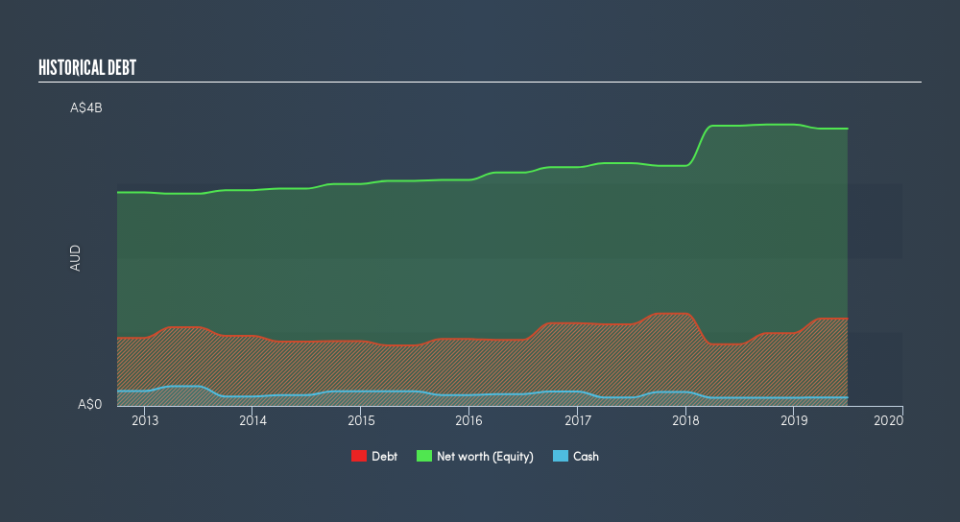We Think Star Entertainment Group (ASX:SGR) Is Taking Some Risk With Its Debt

The external fund manager backed by Berkshire Hathaway's Charlie Munger, Li Lu, makes no bones about it when he says 'The biggest investment risk is not the volatility of prices, but whether you will suffer a permanent loss of capital.' It's only natural to consider a company's balance sheet when you examine how risky it is, since debt is often involved when a business collapses. As with many other companies The Star Entertainment Group Limited (ASX:SGR) makes use of debt. But should shareholders be worried about its use of debt?
When Is Debt A Problem?
Generally speaking, debt only becomes a real problem when a company can't easily pay it off, either by raising capital or with its own cash flow. Ultimately, if the company can't fulfill its legal obligations to repay debt, shareholders could walk away with nothing. However, a more usual (but still expensive) situation is where a company must dilute shareholders at a cheap share price simply to get debt under control. Of course, plenty of companies use debt to fund growth, without any negative consequences. The first step when considering a company's debt levels is to consider its cash and debt together.
View our latest analysis for Star Entertainment Group
What Is Star Entertainment Group's Debt?
As you can see below, at the end of June 2019, Star Entertainment Group had AU$1.18b of debt, up from AU$830.9m a year ago. Click the image for more detail. However, it also had AU$114.3m in cash, and so its net debt is AU$1.06b.
How Strong Is Star Entertainment Group's Balance Sheet?
Zooming in on the latest balance sheet data, we can see that Star Entertainment Group had liabilities of AU$673.8m due within 12 months and liabilities of AU$1.17b due beyond that. Offsetting these obligations, it had cash of AU$114.3m as well as receivables valued at AU$235.5m due within 12 months. So its liabilities outweigh the sum of its cash and (near-term) receivables by AU$1.49b.
While this might seem like a lot, it is not so bad since Star Entertainment Group has a market capitalization of AU$3.76b, and so it could probably strengthen its balance sheet by raising capital if it needed to. But we definitely want to keep our eyes open to indications that its debt is bringing too much risk.
In order to size up a company's debt relative to its earnings, we calculate its net debt divided by its earnings before interest, tax, depreciation, and amortization (EBITDA) and its earnings before interest and tax (EBIT) divided by its interest expense (its interest cover). This way, we consider both the absolute quantum of the debt, as well as the interest rates paid on it.
With a debt to EBITDA ratio of 2.2, Star Entertainment Group uses debt artfully but responsibly. And the fact that its trailing twelve months of EBIT was 8.3 times its interest expenses harmonizes with that theme. Star Entertainment Group grew its EBIT by 5.4% in the last year. That's far from incredible but it is a good thing, when it comes to paying off debt. When analysing debt levels, the balance sheet is the obvious place to start. But ultimately the future profitability of the business will decide if Star Entertainment Group can strengthen its balance sheet over time. So if you're focused on the future you can check out this free report showing analyst profit forecasts.
Finally, a business needs free cash flow to pay off debt; accounting profits just don't cut it. So we clearly need to look at whether that EBIT is leading to corresponding free cash flow. Over the last three years, Star Entertainment Group reported free cash flow worth 7.0% of its EBIT, which is really quite low. That limp level of cash conversion undermines its ability to manage and pay down debt.
Our View
Star Entertainment Group's conversion of EBIT to free cash flow was a real negative on this analysis, although the other factors we considered cast it in a significantly better light. For example, its interest cover is relatively strong. We think that Star Entertainment Group's debt does make it a bit risky, after considering the aforementioned data points together. Not all risk is bad, as it can boost share price returns if it pays off, but this debt risk is worth keeping in mind. In light of our reservations about the company's balance sheet, it seems sensible to check if insiders have been selling shares recently.
When all is said and done, sometimes its easier to focus on companies that don't even need debt. Readers can access a list of growth stocks with zero net debt 100% free, right now.
We aim to bring you long-term focused research analysis driven by fundamental data. Note that our analysis may not factor in the latest price-sensitive company announcements or qualitative material.
If you spot an error that warrants correction, please contact the editor at editorial-team@simplywallst.com. This article by Simply Wall St is general in nature. It does not constitute a recommendation to buy or sell any stock, and does not take account of your objectives, or your financial situation. Simply Wall St has no position in the stocks mentioned. Thank you for reading.

 Yahoo Finance
Yahoo Finance 
